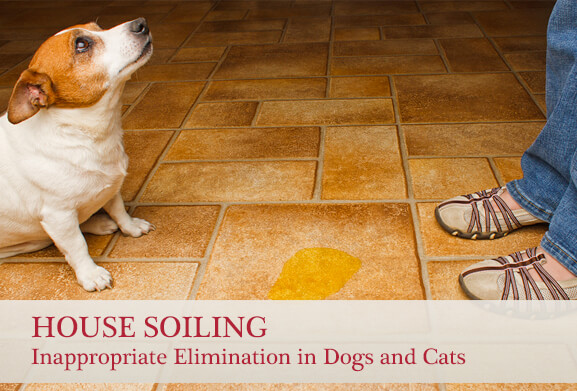No matter how much you love your dog or cat, having a pet who eliminates in the house is frustrating to the pet owner. If you have a problem with your dog or cat eliminating on your floors, furniture or even walls, you need to stop the behavior before it escalates. A little understanding about the causes of the problem, and the steps to take to prevent and stop it, can help.
Rule Out Any Medical Problems
If a dog or cat that has been properly trained to eliminate outside or in the litter box suddenly starts urinating or defecating in the house, the behavior can point to a medical problem. Urinary tract infections, kidney disease, thyroid problems, mental problems and diabetes, all of which can affect pets, can cause house soiling. If you suspect a medical problem or the house soiling starts suddenly, consult with your veterinarian to ensure there is not a medical issue.
House Soiling for Dogs – Common Reasons
For dogs with no underlying medical issue, urinating or defecating inside the house is typically a behavioral issue. Common behavior problems that cause this behavior include:
- Marking of territory
- Separation anxiety
- Excitement urination
- Submission urination
- Urinating or defecating because of anxiety
In addition, inadequate house training can lead to problems with house soiling.
House Soiling in Dogs – Solutions
If the problem stems from territorial marking, and your dog has not been spayed or neutered, then having the dog fixed can help. For most of the other problems, the solution is additional training. The goal is to teach the dog to eliminate in the right place and the right time.
First, determine if your dog has specific times that he is likely to need to go. Try to take your dog outside during these times. When he eliminates outside, offer praise and a treat. In order to praise the behavior, you have to be outside with your dog when he is given his chance to go. If you catch your dog going in the house, clap loudly to startle him and stop the process, then take him immediately outside to finish eliminating. Do not punish the behavior, no matter how frustrating it is, as this can cause your dog to hide when he is going, creating more problems.
For house soiling that occurs due to submission, anxiety or excitement, talk to your vet about proper training options to eliminate this behavior. Your dog may need anti-anxiety medications, or you may need to avoid situations that cause extreme excitement or submission behavior.
House Soiling in Cats – Causes
Causes for house soiling in cats can be quite varied. Look for problems like:
- New litter causing litter box aversion
- Moving the litter box
- Litter box aversion due to a negative experience in the box
- Inappropriate site preference
Spraying is slightly different then urinating and is done when the cat is standing up. Spraying is a marking behavior and tends to occur with unneutered males and unspayed females, but a small number of neutered or spayed cats will spray as well.
House Soiling in Cats – Solutions
If your cat is suddenly avoiding the litter box, consider if something, like the litter or the location of the box, has changed. Also, if your cat had a traumatic experience or pain while using the litter box, going back in can be hard for him. To eliminate this aversion, make sure the litter box is how it has always been, and also make sure your cat can see around him while using the box. You may prefer a covered box, but your cat can find it frightening.
For cats showing a preference to a certain surface, you may not be able to change the behavior. Consider if there is a way to change the litter to match the surface, such as placing a carpet remnant in the litter box or adding an old shirt.
If you catch your cat in the act of soiling in the house, avoid reaction. Negative reinforcement, such as spraying the cat with water, is only effective if you catch the cat starting to urinate or defecate, and you must deliver the punishment every time. Catching your cat every time he goes is nearly impossible, so it’s best to just ignore the unwanted behavior and encourage proper elimination.
If your cat is spraying, consider spaying or neutering to help with the problem. If the cat is already fixed, try to remove stimuli that cause marking behaviors. Clean any areas that have been sprayed using odor neutralizing cleaner to prevent repeat behavior.
House soiling is, understandably, a frustrating problem. If you are having this problem with your dog or cat, consult with your vet to rule out health problems and create a training or scheduling routine that will help teach proper behavior.


We have a small mobile home. A cat that suddenly starts spraying and urinating on furniture and rugs is a major nuisance as the smell is overwhelming and difficult to subdue. Our cat, a very well mannered and delightful animal, all of a sudden started spraying all over the place. So far has not hit the couch, but we had to get rid of a chair as the cushions we found we soaked. We will check with a vet, but if no infection, I fear we will have to let go the animal to an Animal Shelter. Sounds horrid, but to walk into someone’s home that reeks of cat spray is intolerable.
Hi Kathy,
Yes, given that it sounds like your cat is older the first step would be to take him to a vet to ensure there are no medical problems causing this sudden behaviour. If nothing is found then try some of the tips contained in the blog.
Hope this helps
Hi my cat as started to soil on my worktops is there any deterrent i can buy thanks